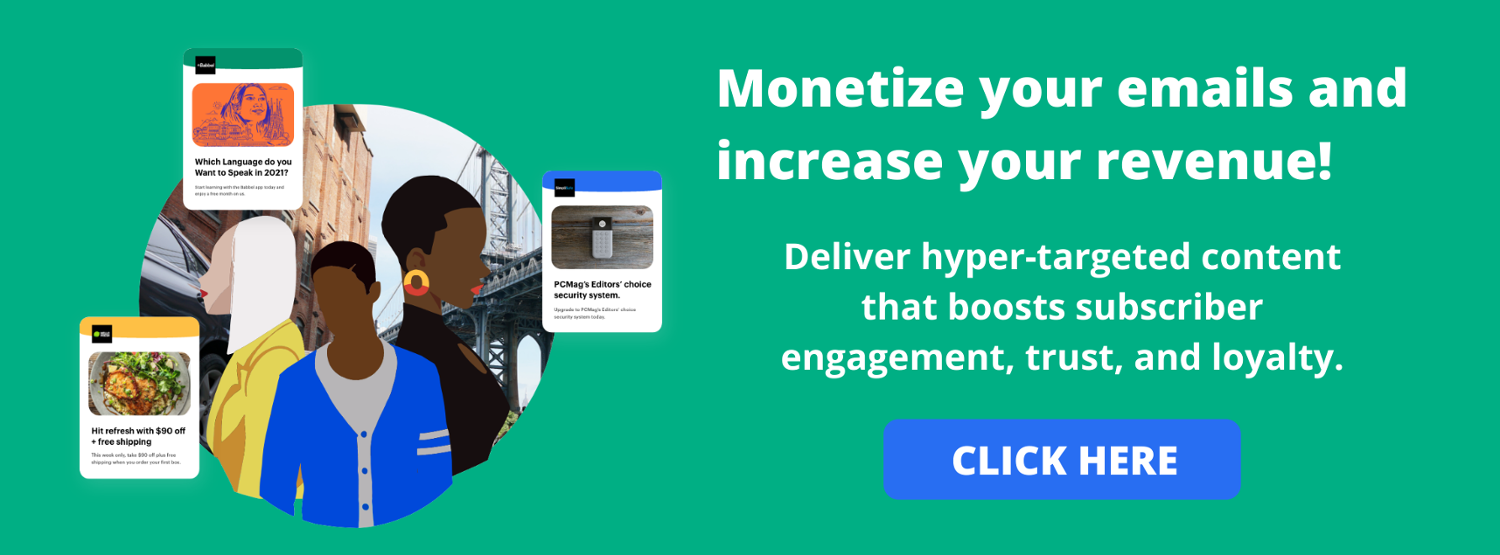“Apps come and go but that Gmail icon on the top left corner of your phone is forever.”
Those are the wise words of Stephanie Talmadge, senior manager of newsletter strategy at GQ, shared during a recent roundtable discussion about how publishers can use email to grow their audiences and expertly navigate a world without third-party cookies.
“I’m not sure that people will ever move away from email,” she added. “I think that is a strength of email looking ahead to the next 12 months. As long as work in our society is structured the way that it is, I think email is positioned for the long haul here.”
In fact, email is a major reason why many publishers survived and even thrived during the pandemic: while ad sales fluctuated, subscriptions and engagement increased, especially on email where consumers could enjoy curated, opt-in, one-on-one content experiences.
So, as 2021 is now well underway, how can publishers build strategies to retain those new subscribers and continue leveraging email to scale their businesses?

We gathered quotes from industry experts to hear how they’re harnessing the power of the most tried-and-true marketing channel on the web today.
Here’s what they have to say:
1. Kimberly Abernathy, retention director, Tribune Publishing
“I’m a huge proponent of being as personally relevant as possible. We’ve seen great success with our recommendations-engine-driven emails. We are able to retarget our subscribers based on their on-site activity and the content they’ve engaged with. We see a lot of potential there for growth.”
2. Julia Beizer, chief product officer and global head of digital, Bloomberg Media
”We need to focus on what we — premium publishers — do best, which is building deeper relationships with our audience and delivering the best user experience and content. Super-serving our audience — especially as more publishers prioritize their subscription business — will in turn help super-serve the needs of brands looking to reach specific audiences. In the end, if publishers and marketers do what’s in the best interest of the audience, we all win.”
3. Tara Sarath, senior manager of email operations, The New York Times
“We’ve really grown our targeting inclusive of data from The Times’ usage of the site as well as traditional and email engagement metrics, and we’ve found that content engagement plus these attributes is actually driving a lot better performance just from a segmentation perspective.”
4. Austin Rief, COO, Morning Brew
“On the audience side, we take a full-funnel approach to growth. We believe in the power of brand, we have a robust referral program, we leverage creative content partnerships, and we take a hyper-focused approach to subscriber acquisition. From an advertising perspective, we are offering our partners custom, content-first experiences on-brand for Morning Brew that bring value to our subscribers and lead to real results for our brand and agency partners. This focus has largely created long-term relationships and partnerships with our clients vs. one-off deals.”
5. Jeff Kupietzky, CEO, Jeeng
“82% of readers do not want to pay for content. The overwhelming majority believe in a free press where consumers don’t have to pay. Most people would prefer not to have paywalls, and monetize the content without asking consumers to pay for it.”

6. Arun Venkataraman, global strategy lead, Google News Initiative, USA
“A big challenge we routinely hear is the struggle to galvanize the organization internally and really make reader revenue a focus or a priority. We start off with cultivating a deep understanding of who the reader is and what they want. I think grounding the understanding in data is absolutely critical […] Readers you have email addresses for are significantly more likely to convert or to become a subscriber. A registration wall can be a great way to make that happen.”
7. Anum Hussain, co-founder, Below the Fold
“We are really focused just on first-party data. And we’re just trying to figure out, what more can you do with an email? What more can you learn just through an email audience? The way we’ve been doing that so far is, every time we hit a milestone, we say, ‘Would you mind giving us feedback?’ We’ll ask them questions. For people who are willing to share, it gives us some directional ideas. We’re trying to learn what we can without infringing on people’s privacy.”
8. Marc Brodherson, McKinsey & Company, New York
“Managing the consumer experience will be a balance between offering free and authenticated content (which requires a registration or subscription to access). Publishers should more aggressively encourage visitors to register or subscribe. Based on our research, we believe that more publishers will allow visitors from a single IP address to access a finite number of free articles per month.”
9. Stephanie Talmadge, senior manager of newsletter strategy, GQ
“We’ve recently started experimenting with more one-off [email] sends when we have big, blockbuster, long-form reporting to share. We do see much better engagement when we send those bigger, more explosive news making stories vs. burying them in a send with six other stories.”
10. David Cohen, CEO, IAB
“Marketing, at a fundamental level, is about knowing your customer. Whoever knows that customer best has the most to gain, and whoever has the least knowledge has the most to lose. Having a robust first-party relationship is becoming more of a business imperative in the ‘Great Reset.’”
Leveraging email: unlock the money in the inbox
Email gives publishers the power to build and nurture direct audience relationships with high-quality, relevant content. They just need to unlock that power with the right tools and strategies for personalization, monetization, and scale.
Jeeng Email helps publishers do just that. Our automated platform curates the email content your readers want to see, delivering hyper-targeted newsletters and real-time engagement that boosts subscribers and meets your bottom line — so you can always get your message across.
Are you driving the most engagement and revenue from the inbox? Reach out now to get started.


